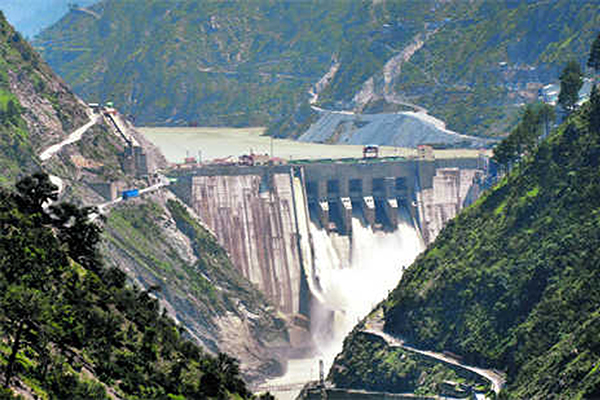India has informed Pakistan of its intent to amend the 62-year-old Indus Waters Treaty for management of cross-border rivers because the Pakistani side’s “intransigence” in handling disputes has raised questions about the integrity of the pact, people familiar with the matter said on Friday.
The “notification for modification” of the treaty was conveyed by the Indian side on January 25 through the Commissioners for Indus Waters of the two sides. India was forced to issue the notice as Pakistan’s actions “adversely impinged” on the treaty’s provisions and their implementation, the people said.
The Indus Waters Treaty was signed in 1960 after nine years of negotiations between India and Pakistan and was brokered by the World Bank, which too is a signatory. It is the most durable treaty between the two countries but has come under considerable pressure in recent years as bilateral relations plunged to an all-time low due to tensions related to terrorism and Jammu and Kashmir.
“India has always been a steadfast supporter and a responsible partner in implementing the Indus Waters Treaty in letter and spirit. Pakistan’s intransigence on the treaty forced India to issue a notice of modification,” one of the people said.
The notice opens up the process for making changes to the treaty for the first time since it was signed in Karachi on September 19, 1960, by then Pakistan president Mohammad Ayub Khan, then Indian prime minister Jawaharlal Nehru and WAB Illif of the World Bank.
“The objective of the notice for modification is to provide Pakistan an opportunity to enter into inter-governmental negotiations within 90 days to rectify the material breach of the Indus Waters Treaty. This process will also update the treaty to incorporate the lessons learned over the last 62 years,” the person cited above said.
The notice was issued in line with Article XII (3) of the treaty, which states: “The provisions of this Treaty may from time to time be modified by a duly ratified treaty concluded for that purpose between the two Governments.”
While explaining India’s move, the people linked it to Pakistan’s actions since 2015 in handling disputes related to Kishanganga and Ratle hydropower projects in Jammu and Kashmir. The pact has a graded mechanism to handle such issues – “questions” are handled by the two Indus Waters Commissioners, “differences” are resolved by a neutral expert appointed by the World Bank, and “disputes” are referred to the court of arbitration, a seven-member arbitral tribunal whose chair is appointed by the World Bank.
In 2015, Pakistan sought appointment of a neutral expert to handle its objections to the two hydropower projects, but it unilaterally retracted this in 2016 and requested a court of arbitration. In 2016, the World Bank appointed both a neutral expert and the chair of the court of arbitration. Though the World Bank put a “pause” on both processes in 2016, this was lifted in March 2022 at Pakistan’s insistence and the processes resumed.
This approach, the people pointed out, was flawed since two simultaneous processes on the same issue can result in inconsistent and contradictory rulings, create a legally untenable situation and even put a question mark on the working and integrity of the treaty. India has been attending meetings convened by the neutral expert but has stayed away from the court of arbitration.
In five meetings of the Permanent Indus Commission held during 2017-22, India raised its objections to both processes running concurrently but Pakistan refused to discuss the matter, the people said.
In Islamabad, Foreign Office spokesperson Mumtaz Zahra Baloch signalled Pakistan’s intention to carry on with the court of arbitration. “As we speak, a court of arbitration is holding its first hearing in The Hague on Pakistan’s objections to Kishanganga and Ratle hydroelectric projects,” she said.
“The court of arbitration has been set up under the relevant provisions of the Indus Waters Treaty,” she said, adding media reports on the Indian proposal regarding the treaty should not divert attention from the “important proceedings of the court of arbitration”.
The people said parallel consideration of the same issue is not covered under any provision of the Indus Waters Treaty. The Indian notice seeks a review and modification of the treaty to clarify existing ambiguities and address the “material breach” of the pact’s provisions, the people said.
The World Bank will have no role in the proposed negotiations, which will be open ended and cover all aspects of the treaty, the people said.
At the time of independence in 1947, the India-Pakistan boundary was drawn across the Indus Basin, leaving Pakistan as the lower riparian state. A dispute arose because some key irrigation works, including one at Madhopur on Ravi river and another at Ferozepur on Sutlej river, on which the irrigation canal supplies in Pakistan’s Punjab province were completely dependent, were left in Indian territory.
The treaty allocated the western rivers – Indus, Jhelum, Chenab – to Pakistan and the eastern rivers – Ravi, Beas and Sutlej – to India. It also allowed each country certain uses on the rivers allocated to the other. The World Bank’s role is largely procedural and limited to designating neutral experts or the chair of the court of arbitration.


















